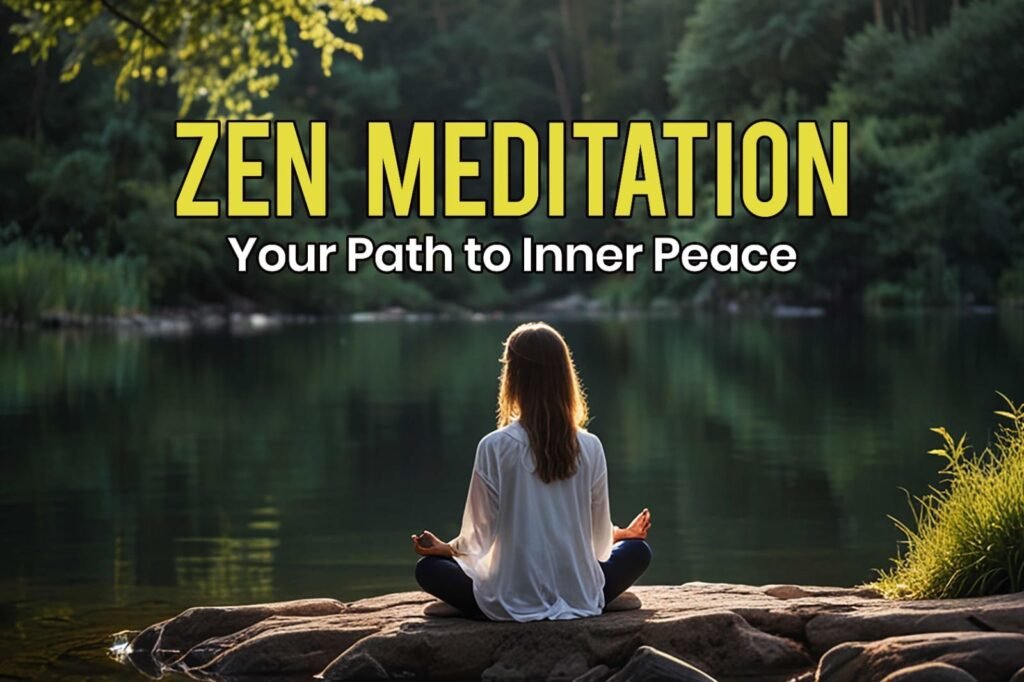Table of Contents
ToggleZen Buddhism is a complete evolution that took over the period. One want to feel a proper position and give equal opportunities to everyone regarding perfection and realization of personhood. Zen Buddhism emphasizes the performance of meditation and exploring a involving experience of enlightenment. The term “Zen” is derived from the Chinese word “Chan,” which meant to be arrived from the Sanskrit word “Dhyana,” meaning meditation.
The core duty of Zen meditation implies in the practice of Zazen, or seated meditation. This practice is important to Zen Buddhism, aiming to educate mindfulness and a direct understanding of the nature of reality. It teaches that the ultimate truth is only realised via firsthand experience and is beyond words and notions. A thorough investigation of oneself and the nature of reality is encouraged by Zen.
What is Zen?
In Zen Buddhism, enlightenment, or “Satori,” is seen as a sudden switch to the true nature of existence. This realization is not something that can be attained through logical reasoning or intellectual study but is experienced directly through meditation. Zen teachings often use paradoxical statements or “koans” to help participants break free from conventional thinking and experience this awakening. Zen Buddhism centers on direct, experiential understanding, Evoking the importance of the practice of meditation (zazen) as the primary means to attain Insights. The concept of “no mind” (mushin) is a must-have, encouraging a state of consciousness free from attachment to thoughts or desires. Ultimately, Zen is about awakening to the upscaled clarity and peace within, transcending dualistic thinking to experience life directly and fully.
The role of zazen ( Sitting Meditation)
The central practice of Zen Buddhism is zazen, or sitting meditation, which is used to develop awareness, inner serenity, and spiritual awakening. It entails sitting erect and steadily, usually with crossed legs, and concentrating on the breath by merely watching thoughts detached from connection. People who do regular Zazen on a timetable can improve their focus, clarity, and for controlling emotional stability, which will slowly lead to a sense of emotional balance and relief in their lives. Sitting is the practice of zazen (Shikantaza). Non-attachment is one of the main lessons of Zen, and practicing zazen promotes this idea.
While Zazen can also be performed individually, it is merely done only within the concept of a Zen community or Sangha. In Zen, the concept of emptiness (Sunyata) is central and core to understanding the nature of reality. Emptiness in Zen not only refer to nothingness but also to the idea that all things are interdependent and less inherited towards fixed existence. Zazen is more than a meditation posture it is a way of life. It is a path that motives to self-realization, inner peace, and a deeper understanding of the nature of reality.
Why is Zen Meditation different?
1.Focus on the present moment
In Zen meditation, the primary goal is to be fully present in each moment. Unlike other meditation practices that might use mantras, visualizations, or guided imagery. Zen Buddhism encourages practitioners to sit in silent awareness, observing thoughts, sensations, and emotions without attachment. The practice revolves around breath awareness, typically focusing on the sensation of breath, and it turns out the present moment to foster a deep sense of mindfulness and helps dissolve the ego on the past or worry about the future.
2.Emphasis on Naturalness
Zen meditation impose and focus in returning to one’s natural state of being, which is often described as a state of “no mind” or “starter’s mind.” This naturalness expands beyond the meditation concept and involve into daily life. Whether it’s walking, eating, or working, each moment is an opportunity to practice Zen meditation, making it a perfect road of life rather than just a meditation time.
3.The Role of a Zen Teacher (Roshi)
The guidance of a Zen teacher, or Roshi, is a collective person in the practice. Unlike other forms of meditation where instruction might be more generalized, a Roshi offers personalized guidance, helping students navigate the subtleties of their practice. The Roshi’s role is to point the student toward their inherent wisdom, often by pushing them to face their own mental and emotional barriers. Its simplicity, focus on naturalness, and the guiding hand of a Roshi create a unique approach to meditation that is as preferred as it is fine.
BENEFITS OF ZEN MEDITATIONS
Zen meditation, is a practice emerged in Zen Buddhism that deals mainly with seated meditation to improve and enhance mindfulness, and to create a deep understanding of one’s true and reliable nature. Let’s look at some benefits:
Physical Benefits
- Decreased Stress: Zen meditation lowers cortisol levels in the body and reduces stress by stimulating the parasympathetic nervous system.
- Better Sleep: By upraising calm and decreasing anxiety, regular meditation helps to enhance sleep in a good way
- Improves Attention and Concentration: Making conscious mind to concentrate and focus on the present situation, the practice will helps to evolve attention and make able to point out a thing.
- Control Blood Pressure: By relaxing the mind and lowering stress levels in the body, zen meditation helps reduce blood pressure and lead a healthy life.
- Pain Management: Research shows that it can reviewed in pain management by modifying and lowering the emotional action to it.
Mental Benefits
- Enhanced Mindfulness: Through the practice of mindfulness, people can learn to be more purposefully look for their thoughts, feelings, and surrounding.
- Decreased Anxiety and despair: Zen meditation helps distract the feelings of anxiety and despair by improving and involving in a nonjudgmental awareness of the present moment.
- Enhanced Emotional Regulation: By encouraging a constant emotional state, the technique helps people in reacting to circumstances with more perfection and clarity.
- Mental Balancing: Consistent practice enhances mental stability, which makes it easier for people to handle stress, difficulties, and uncertainties.
Spiritual Benefits
- Self-Realization: A greater feeling of self-realization can be attained through practicing Zen meditation, which is a way towards comprehending one’s true essence.
- Connection to the Present: People are able to live life to the fullest because it strengthens their connection to the present.
- Empathy and Compassion: Through cultivating a more profound comprehension of all creatures, Zen meditation promotes the growth of empathy and compassion.
- Spiritual Development: By helping people overcome their ego’s constraints, the practice is a path of ongoing spiritual development.

TOP ZEN MEDITATION TECHNIQUES
- Zazen (Sitting Meditation): The shell breaking of Zen practice, Zazen involves sitting in a specific posture, concentrating on the breath, and developing a state of mindfulness and static presence.
- Koan Practice: A meditative practice using questions or statements (koans) that questions logical thinking. By meditating on a koan, participants aim to break through mental well-being and reach the peak of serenity.
- Walking Meditation (Kinhin): Involves slow, mindful walking, often between periods of Zazen. Looking thoroughly on each step, synchronizing movements with breath, which helps maintain mindfulness in moving.
- Tea Ceremony (Chado): An act of preparing and drinking of tea that balances simplicity, and harmony. The ceremony is a meditative practice that connects the mind and body, fostering a sense of peace in everyday actions.
HOW TO DO ZEN MEDITATION AT HOME
- Creating a Meditation Space: Choose a quiet, noiseless area with minimal distractions. You can add a sponge bag or mat and consider simple decor like calming elements such as a candle.
- Basic Posture: Sit on a mat in the lotus or half-lotus position, with your back straight and hands placed on your fingers folding a mudra. Or else, you can sit on a chair with your feet flat on the floor.
- Breath Awareness: concentrate on your breath, looking after the programming process of air entering and leaving your nose. Count each breath to help maintain focus and be gentle.
- Overcoming Challenges: Start with short sessions, gradually increasing the time. If your mind becomes restless, acknowledge the thoughts without judgment and focus on your breath. Consistency and patience are key to deepening your practice.
GLOBAL PERSPECTIVE ON ZEN MEDITATION
Zen meditation, also known as Zazen, has seen a Prominent space in global popularity, accomplishing its origins in Japan and spreading across continents. In the United States, Zen meditation has been embraced as part of a broader mindfulness movement, about numerous Zen centers and meditation retreats established in major cities and rural areas alike. Europe, particularly countries like Germany, France, and the United Kingdom, has also witnessed a complete preference for Zen practice, often associated with a growing interest in Eastern philosophies and alternative spiritual practices. In Asia, beyond Japan, countries such as South Korea and Vietnam have large Zen Buddhist populations, with Zen practice deeply woven into their cultural and religious fabric. Australia and Canada are also notable in space for their expanding Zen communities, with many participants drawn to the simplicity and discipline of Zazen.
The growth of Zen centers and retreats worldwide reflects a broader global interest in meditation as a tool for mental well-being, stress relief, and spiritual searching. This spread of Zen practice across diverse cultures highlights its universal appeal and adaptability, making it a significant force in the global meditation landscape. Step into the change and calm your selves with zen meditation.
Take control of your life today by practicing Zen breathing techniques and experience incredible mental and physical benefits. >>Begin taking control of your life today.
CLOSURE
Zen Buddhism and Meditation foster a detailed view of your life helping us achieve our dedicated vision of life. Be the You by combining the practices of Zen meditation. Hidden Mantra is a space that discusses the vision and Cultural aspects like Yoga, Buddhism, etc. Achieve trustworthy and reliable sources from Hidden Mantra blogs regarding the topics. Follow Hidden Mantra to achieve more informative content. Namaste!









